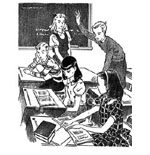
Dystopia 101
A POST-'TRADITIONIS CUSTODES' SHORT STORY
The other day I was trying to explain to my students the concept dystopia. Shouldn’t be hard, I thought going into the exercise, given the bend sinister in just about every official pronouncement that has shaped their public-school minds. Yet, no, I had a tough time of it.
“In George Orwell’s novel Nineteen Eighty-Four,” I began, “the main character, Winston Smith, lives in a dystopia. It’s a world in which Big Brother, the all-powerful ruler who should be like a caring elder sibling to him, oversees a surveillance state on the lookout for any thought, word, or behavior of his that might be looked upon as a warrant for crushing him.” Etcetera. Then I asked, “What do you guys think?”
“Like in a rowboat?” That was the class’s most assiduous note-taker, Julia Estock.
“Like in either/or,” I answered, and I spelled it for her: “O-r-w-e-l-l.”
“He work for Fox News?” That was Jason Havermeyer.
“My grandfather watches that station.” That was Havermeyer’s buddy, Justin Winkleman.
And so on for two or three more minutes. No, the Nineteen Eighty-Four illustration was not proving helpful. I tried another approach. “You guys ever hear of Paul Simon?”
“My grandfather listens to him.” That was Winkleman again. When I looked at him sharply, he added, “On YouTube. He likes YouTube.”
“Anyone else?” I asked.
You May Also Enjoy
We resist the urge to parse every questionable utterance that issues from the Pope’s mouth because the exercise is exhausting and not a little discouraging.
We ought to be thankful to Pope John Paul II, who set the stage for this momentous improvement of the Mass in the vernacular.
Joseph Cardinal Zen Ze-kiun, archbishop emeritus of Hong Kong, calls the looming Vatican-China deal a "shameless surrender" that legitimizes the communist regime's episcopal appointments and "enslaves the Church."

